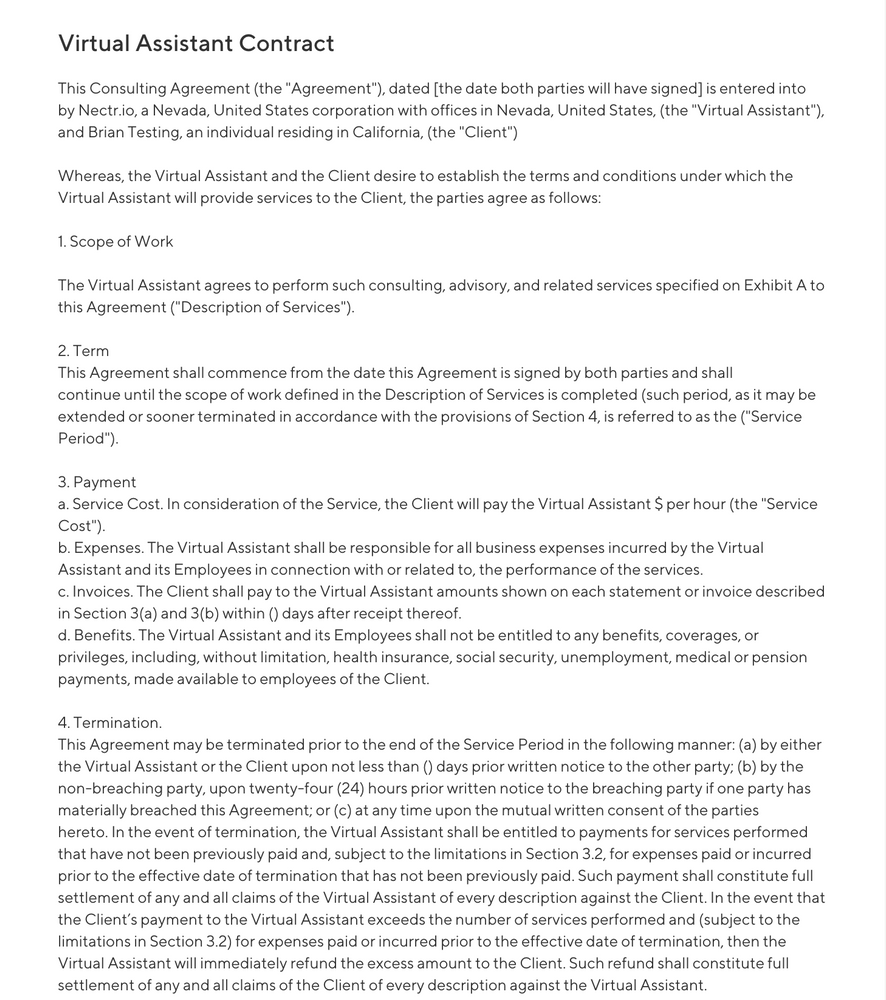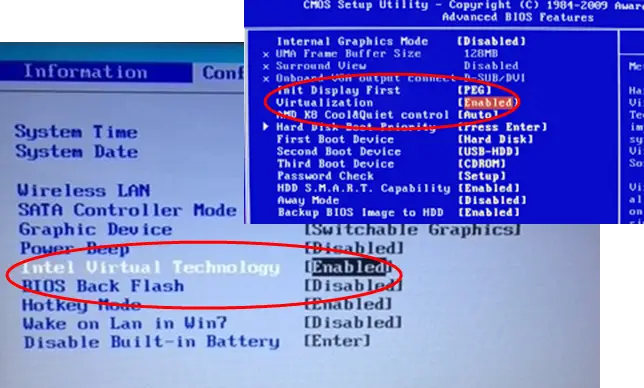Are you tired of dealing with the administrative tasks that come with running a business? Or perhaps you’re struggling to keep up with the workload and need additional assistance. Whatever the case may be, hiring a virtual assistant can be a game-changer for your business. However, before you dive into this new venture, it’s crucial to understand the importance of setting up contracts with your virtual assistant.
Contracts are a vital aspect of any business relationship, and the same applies to virtual assistants. Not only do they protect both parties involved, but they also establish clear expectations and boundaries. In this guide, we’ll take you through the essential steps to setting up contracts with your virtual assistant, ensuring a seamless and productive working relationship. So, let’s get started!
Setting up contracts for a virtual assistant is not a complicated process. First, you’ll need to make sure you understand the terms and conditions of your contract with the virtual assistant. Then, it’s important to create a detailed job description, outlining the duties and responsibilities of the VA. After that, set the hourly rate or salary rate, along with any bonuses or additional compensation. Finally, you’ll need to draw up a contract that outlines the agreed-upon terms and have both parties sign it.
You can also make use of free virtual assistant contract templates as a starting point. These templates generally contain all the key components of a contract and can be easily customized to fit your specific needs. When the contract is completed, be sure to have both parties sign it and keep a copy for your own records.

How to Set Up Contracts for a Virtual Assistant
Having a virtual assistant can be an invaluable asset to any business or individual. However, it’s important to make sure that the relationship is properly documented with a contract. A contract sets out the expectations of both parties, ensures the VA is properly compensated, and allows for smooth payments. By taking the time to set up a contract before beginning the relationship, you’ll be able to protect yourself and your virtual assistant.
1. Understand What You Will Need
Before you can set up a contract, it’s important to understand exactly what a contract should include. A contract should clearly define the type of work the virtual assistant will be doing, the duration of the work, the payment rate, and any other agreed-upon terms. Contracts should also include a statement of confidentiality, as well as a statement of ownership of any work product produced by the virtual assistant.
In addition to the above, it’s important to consider any additional information you may need to include in the contract. Depending on the nature of the work, you may want to include provisions for intellectual property, non-disclosure, or other legal protections.
2. Get the Contract in Writing
Once you’ve determined the content of the contract, you’ll need to get it in writing. A contract should be drafted by a qualified attorney to ensure it meets all legal requirements and provides the necessary protection for both parties. The contract should be signed by both parties, and a copy should be kept on file for both parties as well.
If you need help finding a qualified attorney, you can use a legal services website such as LegalZoom or UpCounsel to connect with an attorney who specializes in contract law. Once you’ve found an attorney, they will be able to draft the contract and get everything in writing.
3. Keep the Contract Current
Once the contract is in place, it’s important to keep it up-to-date. As the relationship between you and your virtual assistant progresses, the contract should be adjusted to reflect any changes in the work, payment rate, or other terms. It’s also important to regularly review the contract to make sure it still meets the needs of both parties.
4. Make the Payment Process Easier
In addition to the contract, it’s important to set up a payment process for the virtual assistant. Depending on the type of work, it may be necessary to set up a direct deposit or online payment system to make sure the virtual assistant is paid on time. Additionally, it’s important to establish a payment schedule that works for both parties.
5. Establish Clear Communication
Finally, it’s important to establish clear communication between you and your virtual assistant. Having a contract in place is important, but it’s also important to communicate frequently to ensure the work is being done correctly and on time. You should also make sure to have regular check-ins with the virtual assistant to discuss any changes or updates to the contract.
6. Know Your Rights Under the Contract
It’s important to understand your rights under the contract. This includes the right to terminate the contract if the virtual assistant does not meet their obligations, as well as the right to seek legal recourse if necessary. Additionally, you should be familiar with any applicable laws or regulations that may apply to the contract.
7. Review the Contract Regularly
Finally, it’s important to review the contract on a regular basis. This will help ensure that the contract is up-to-date and meets the needs of both parties. Additionally, it will help ensure that any changes or updates to the contract are addressed in a timely manner.
Frequently Asked Questions
Creating a legally-binding contract for your virtual assistant is essential to ensure the success of your business relationship. Here are the answers to some frequently asked questions about setting up contracts for a virtual assistant.
1. What is a virtual assistant contract?
A virtual assistant contract is a legal document that outlines the terms and conditions of an agreement between a business and a virtual assistant. The contract outlines the duties, responsibilities, and expectations of both parties, as well as the rights and obligations of each. It also sets out the payment terms and any other specific details related to the agreement. The contract should be signed by both parties in order to be legally binding.
2. What should be included in a virtual assistant contract?
A virtual assistant contract should include the following: the names and contact information of both parties; a detailed description of the services the virtual assistant will provide; the duration of the agreement; the terms of payment; a confidentiality clause; and any other specific terms related to the agreement. It is important to ensure that the contract is clear, comprehensive, and legally binding.
3. What are the benefits of having a contract for a virtual assistant?
Having a contract for a virtual assistant can provide a number of benefits. A contract can help ensure that both parties understand their obligations and responsibilities, as well as any potential risks or liabilities. It can also provide a framework for resolving any disputes that may arise during the course of the agreement. A contract can also protect the business from any potential legal issues that may arise.
4. How do I create a contract for a virtual assistant?
Creating a contract for a virtual assistant requires careful consideration and legal expertise. It is important to ensure that the contract is comprehensive and legally binding. It is also important to ensure that the contract is tailored to the specific needs of the business and virtual assistant. It is recommended to seek the advice of a lawyer or contract specialist to ensure that the contract is drafted correctly.
5. What are the risks of not having a contract for a virtual assistant?
The risks of not having a contract for a virtual assistant are significant. Without a contract, there is no legal recourse for either party if the agreement is breached. Without a contract, there is no assurance that the virtual assistant will be held accountable for their work or that the business will be compensated for any losses suffered as a result of the agreement. Additionally, without a contract, there is no protection against potential legal disputes or liability.

In conclusion, setting up contracts for a virtual assistant is a critical step in ensuring a successful working relationship. The process may seem daunting at first, but with the right tools and guidance, it can be a seamless and straightforward process. Remember to define the scope of work, set clear expectations, and establish communication protocols to avoid misunderstandings and ensure timely delivery of tasks.
Ultimately, a well-written and comprehensive contract will protect both the virtual assistant and the client, and provide a solid foundation for a long-lasting and successful partnership. So, take the time to draft a contract that reflects your unique needs and requirements, and don’t hesitate to seek professional advice or support if needed. By investing in this process, you can set yourself up for success and reap the benefits of a productive and efficient virtual assistant.



